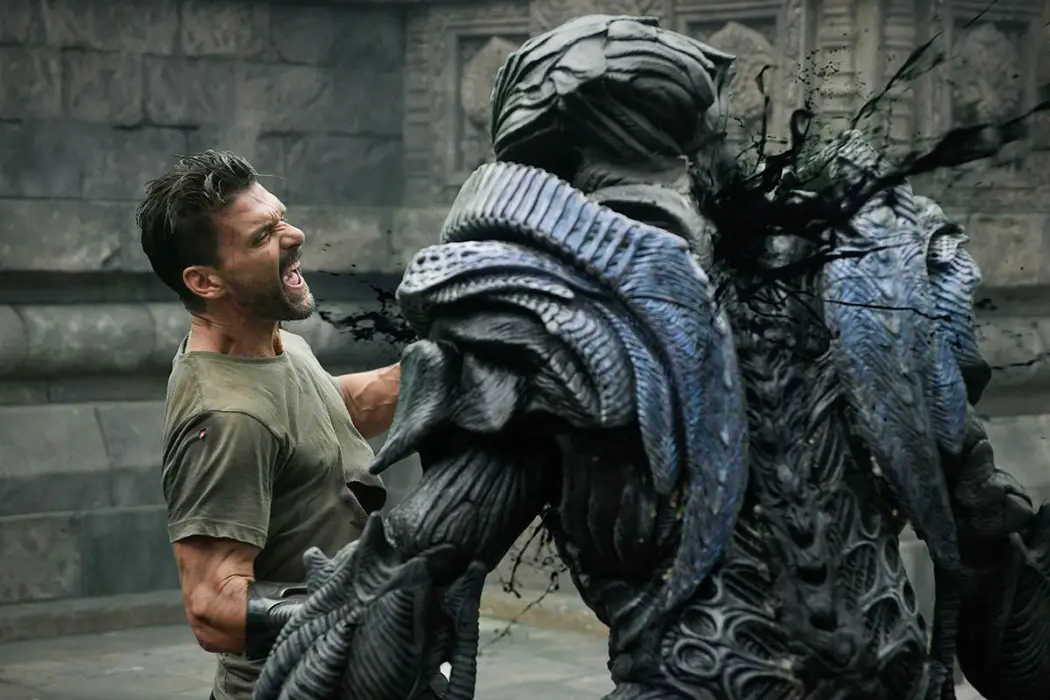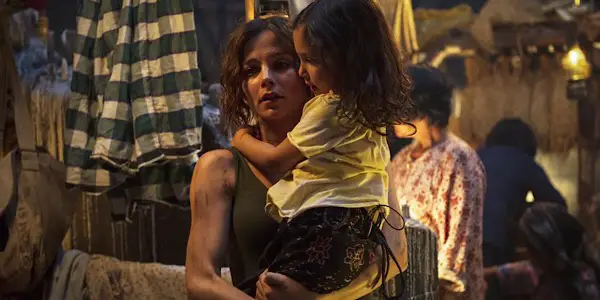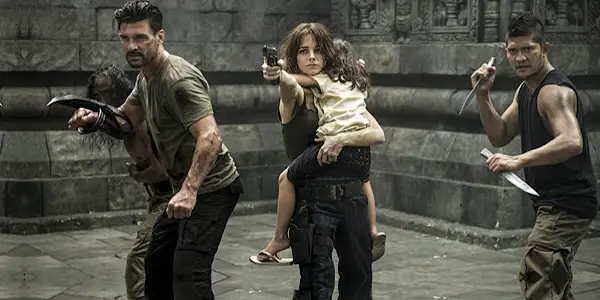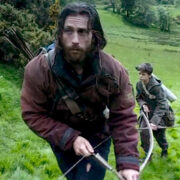BEYOND SKYLINE: When A Guilty Pleasure Isn’t That Fun

Kristy Strouse is the Owner/Editor in Chief of Film Inquiry,…
In 2010, you might remember the film Skyline, or perhaps not. The original movie boasted a new spin on the alien sci-fi genre, and while it had some original elements, it was still lacking in genuineness. In the first, we saw the extraterrestrial attack from the inside of a Los Angeles loft, as a group of friends tried to avoid the impending destruction. From a visual perspective Skyline was admirable, but the character and plot development were lacking. Liam O’Donnell, who co-wrote the screenplay for the first, returns to write and direct the sequel.
For a movie like this, a science-fiction romp that doesn’t take itself too seriously, there is some acceptable space for imperfections. After all, there are certain liberties to be taken regarding validity and seriousness, so some suspension of belief is necessary. Even so, Beyond Skyline doesn’t quite maintain its rousing capabilities. Everything is improved, but it’s still lacking.
A Step Up
Beyond Skyline has a new cast, headed by detective Mark (Frank Grillo), his son Trent (Jonny Weston), and Audrey (Bojana Novakovic), a transit worker. There are the same entrancing blue lights that lure humans into the ship, but with this chapter we get more of the attack on a global scale, as well as insight into the aliens themselves, specifically when Trent is taken aboard their craft and Mark goes after him.
Things heat up quickly this time. After Trent gets in a fight, arrested but not charged thanks to his father being a detective, Mark comes to pick him up. After a few minutes on the subway the train stops, and the attack has begun.

Reminiscent of War of the Worlds, they capture humans to extract their organs (in this case brains), but instead of it being food, it powers these alien soldiers. If you saw Skyline you’ll recall this at the end of the film, when one character is able to remember who he is from inside this monstrous exterior. He works to save his pregnant wife, which ignites the interesting idea… can they be brought back?
Grillo encounters that pregnant character from the first film, delivering her baby, which has been infected with alien DNA. This child, under his care throughout, grows at a rapid pace, and may just be the key to their survival.
The special effects are well executed, creating a blockbuster-like aesthetic with an abundance of creatures and alien technology. There are also some well-coordinated martial arts sequences. The dialogue isn’t as cheesy as the first movie, but there is still room left for hollow and gimmicky one-liners. This second go around had a bigger scale, hinging on world-saving versus self-preservation, and that was okay.
So, what didn’t work?
What Went Wrong?
Mark is unable to save Trent, and as the story progresses the environment changes from LA to the ship, and to even Southeast Asia. The main survivors meet up with siblings Sua and Kanya (Iko Uwais and Pamelyn Chee), and are brought into a resistance hideout. Along with the aliens, they are also battling the local militia, and through it all the child continues to grow increasingly fast. Not that this plot twist is particularly surprising, but as the first film did in its end sequence, some of the humans who have had their brains implanted into the alien suits retain awareness. Trent, in particular, seems to remember who he is within his alien shell.

This aspect of the story is exemplified in the remainder of the movie, becoming a tool for the humans in battling the aliens. In the last section of the film the story becomes too inflated, making the choice to go big or go home. It probably should have been the latter. The characters aren’t that interesting, and it makes the impact significantly less when you don’t invest as much.
Grillo is his usual gruff self, effectively portraying the tough-as-nails cop. The dysfunctional relationship he has with his son Trent feels slightly forced and contrived. I wish his character and especially Audrey’s had more depth. These are the two main focal points throughout the movie, but there isn’t much tying us to them. The script, while recognizing that it’s a film reliant on action, is too lax with character development.
Conclusion: Beyond Skyline
Large on effects, short on material, even for a science-fiction B movie, it’s not as fun as it could be. Just like the film itself, I don’t take it too seriously. When I critique this kind of movie it is done so differently than others.
While better than its predecessor, Beyond Skyline is still a sequel to a thinly conceived film, and even the freshest coat doesn’t work to hide the issues underneath. This might satisfy fans of the genre, or work as a guilty pleasure, but it’s not a stand-out by any means.
What did you think? Do you disagree? Tell us why/how in the comments below!
Beyond Skyline was released December 15th in the US and is available on VOD services. For more information on the film click here.
Does content like this matter to you?
Become a Member and support film journalism. Unlock access to all of Film Inquiry`s great articles. Join a community of like-minded readers who are passionate about cinema - get access to our private members Network, give back to independent filmmakers, and more.
Kristy Strouse is the Owner/Editor in Chief of Film Inquiry, writer, podcaster, and all around film and TV fanatic. She's also VP of Genomic Operations at Katch Data and is a member of The Online Association of Female Film Critics and The Hollywood Creative Alliance. She also has a horror website: Wonderfully Weird & Horrifying.












